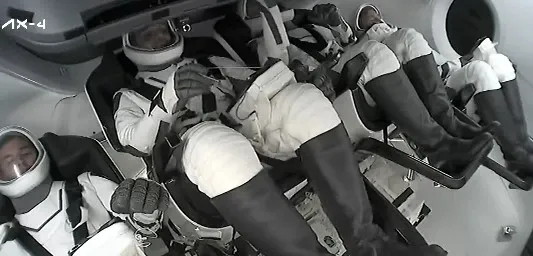Is Indian Astronaut Shubhanshu Shukla Orbiting Earth to Dock Today at the Space Station?

Synopsis
Key Takeaways
- Shubhanshu Shukla is the first Indian astronaut to reach the ISS.
- Launched from NASA's Kennedy Space Center.
- Shukla will conduct experiments on food and space nutrition.
- His journey symbolizes India's advancements in global technology.
- Research focuses on sustainable life-support systems for future missions.
New Delhi, June 26 (NationPress) IAF Group Captain Shubhanshu Shukla is making history as he becomes the first Indian to reach the International Space Station (ISS). Alongside three crew members from the US, Poland, and Hungary, Shukla is set to dock at the orbiting laboratory at 7 a.m. EDT (4:30 p.m. IST).
Hailing from Lucknow, Shukla launched to the ISS at 2:31 a.m. EDT (12 noon IST) from Launch Complex 39A at NASA’s Kennedy Space Center in Florida, aboard a new SpaceX Dragon spacecraft, propelled by the Falcon 9 rocket.
NASA announced, "The SpaceX Dragon spacecraft, carrying four Axiom Mission 4 (Ax-4) crew members, is currently orbiting Earth and en route to the ISS after its launch from Kennedy Space Center at 2:31 a.m. EDT on Wednesday."
The Dragon is carrying Ax-4 Commander Peggy Whitson, Pilot Shubhanshu Shukla, and Mission Specialists Sławosz Uznański-Wiśniewski and Tibor Kapu.
It is scheduled to dock at the Harmony module’s space-facing port at 7 a.m. on Thursday, NASA added.
After 41 years, India will finally have an astronaut in space. Shukla will be the second Indian in space, following Rakesh Sharma's flight in 1984.
In a message during his journey to the ISS, Shukla expressed, "Namaskar, my dear countrymen! What a thrilling ride! We are back in space once again after 41 years. It's a remarkable experience. We're orbiting Earth at a speed of 7.5 kilometers per second.”
He further emphasized, "This is not merely my journey; I am carrying the Indian flag with me. This is a journey of India’s human spaceflight."
To satisfy his cravings for home-cooked food in space, he has brought carrot halwa, moong dal halwa, and mango nectar.
The Axiom-4 Mission signifies not only a scientific achievement but also highlights India’s growing status as a global technology leader. It reinforces the nation’s potential to spearhead space innovation, promote sustainability and contribute significantly to global missions.
Upon arrival at the ISS, Shukla will engage in groundbreaking experiments focused on food and space nutrition.
These experiments, developed through a collaboration between ISRO and the Department of Biotechnology (DBT), with assistance from NASA, aim to deepen understanding of sustainable life-support systems, crucial for future extended space missions.
The research will also investigate the effects of microgravity and space radiation on edible microalgae—an essential, nutrient-dense food source for upcoming space expeditions. The experiment will assess key growth parameters and explore transcriptomic, proteomic, and metabolomic changes across various algal species in space compared to their behavior on Earth.







